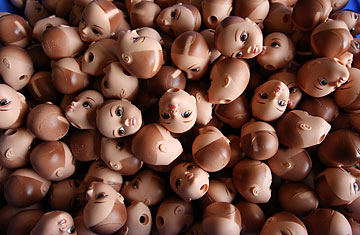
Toys for export in a workshop in Hainan, China
For trade policymakers, a resonant message from the recent World Economic Forum conference in Davos, Switzerland, was the need to guard against protectionism amid the global financial crisis. Indian Trade Minister Kamal Nath led a chorus of Davos voices warning that governments, desperate for measures to preserve their slumping domestic industries, might move to restrict imports to ease competitive pressures — a formula that in the past has only exacerbated economic downturns by sparking commerce-killing trade wars.
But just days after Nath's warning, India is being accused of raising trade tensions between the world's two largest emerging economies by imposing a temporary ban on imports of Chinese-made toys. The six-month ban was announced Jan. 23 by the Indian Directorate-General of Foreign Trade, which issued a two-sentence notification saying the restriction was being made "in public interest." Today, two weeks after the announcement, Nath finally spoke up on the matter, saying that India's step is WTO-compatible, and has been taken to ensure public safety. "The decision to ban was taken on the grounds of public health and safety," he said. "This is just a one-off issue, otherwise India-China trade is booming. Public health and safety should get priority over commerce."
But China was swift to condemn the ban as protectionist. The China Daily, the official government newspaper, reported that Beijing may contest India's measure by taking the matter to the Dispute Settlement Body of the World Trade Organization (WTO). The newspaper cited WTO rules against "illegal trade barriers and punitive measures at a time when protectionism is growing amid the global economic recession."
But Indian industry officials were just as quick to deny India was violating the international fair-trade standards. "There is nothing protectionist about it," says Anjan Roy, economic affairs advisor at the Federation of Indian Chambers of Commerce and Industry. Roy pointed to a spate of scandals in 2007 over the safety of Chinese-made toys. In August 2007, Mattel, the U.S.'s leading toy company, was forced to recall 9 million of its products made in Chinese factories due to high lead levels in paint and other safety issues. "If it is a very harmful product, India has a right to ban it," Roy says. That sentiment was echoed by Toys Association of India president Raj Kumar, who denied that his industry group lobbied the government to protect Indian toymakers facing competition from the cheaper and wider range of Chinese toys. "There is a public interest litigation filed by an NGO in the Mumbai High Court questioning the safety of Chinese toys," Kumar says. "The court is expected to rule that safety norms be implemented," he added, saying this prompted the government's move.
More than $330 million worth of Chinese toys are imported by India annually, which accounts for over 60% of the total sold by Indian retailers. D.S. Rawat, secretary-general of the Associated Chambers of Commerce and Industry, says the ban is necessary not for safety reasons, but to guard against Chinese toymakers flooding the market with its products. "We have already been warning the government against dumping by China, Indonesia, Malaysia and Thailand," he says.
Fears over Chinese imports are rife in India even though, or perhaps because, bilateral trade between the two countries is burgeoning at nearly 50% a year and the balance of trade is widening in China's favor. In 2004, when bilateral trade was $13.4 billion, the trade balance was in India's favor to the tune of $1.7 billion. But by 2006, India's trade balance had swung to a deficit of $4.12 billion, which grew to $16 billion last year. China is India's largest trading partner.
India's toy industry, which employs some 2 million people, has been complaining of unfair competition since China joined the WTO in 2001. "Plenty of people lost their livelihoods when the Chinese swamped the market," says Subhash Gorwaney of Khazana, which manufactures wooden educational toys, "They offered similar products, more variety, unbelievably low prices, but also lower quality." He added that the competition has not been without benefit. Indian manufacturers "have changed their methods, introduced innovations, and overall the bar has been raised."
China over the past seven months has been at the receiving end of adverse trade measures by other major trading partners. In December, the E.U. imposed anti-dumping duties on Chinese screws and bolts. In June, the U.S. imposed anti-dumping duties on four Chinese product categories including steel pipes, a move that prompted China to lodge a complaint with the WTO. But according to Vineet Aneja, partner at Delhi-based corporate law firm FoxMandal Little, India may have difficulty defending its case in any WTO action. "The WTO may not uphold the ban since not enough reason has been given," Aneja says. Officials at the Directorate-General of Foreign Trade were not available for comment.
In the past, India and China have often worked together at the WTO on issues of common interest such as seeking an end to agricultural subsidies and non-tariff barriers in developed countries' markets. But the current trade dispute may be divisive partly due to the dire straits of China's toy industry. The Chinese Ministry of Commerce last month announced that nearly 1,000 Chinese toy exporting companies in its Guangdong province had closed in 2008.
